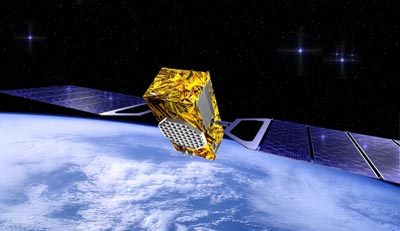Galileo and the Chinese: one thing after anotherby Taylor Dinerman
|
| No one should dream of underestimating the determination of the EU’s ruling elite to build Galileo. However, the project’s delays and cost overruns are raising some interesting possibilities. |
Even more interesting is the story that the Europeans are not only mad at the Chinese, they are also mad at the Americans. Washington has refused to put pressure on Beijing to comply with their wishes. This is ironic, of course, in that Galileo was not exactly conceived with the best interests of the United States in mind. It seems that some EU negotiators even threatened to pull out of the 2004 US-European agreement on the frequency overlay issue—not exactly the best way to begin their relationship with the new Obama Administration.
No one should dream of underestimating the determination of the EU’s ruling elite to build Galileo. They have long seen it as a cornerstone of the new European entity they hope will become the most important superpower in what they expect will be a “Post-American” world. They will pursue it even if it hurts their relations with both the US and China. It has taken on a symbolic value all its own, and thus no matter what happens economically and diplomatically the show will go on.
However, the project’s delays and cost overruns are raising some interesting possibilities. Russia is rapidly rebuilding its GLONASS system and it will soon be back in full operation and for certain Arctic applications it may even be superior to GPS. Japan’s Quasi-Zenith Satellite System (QZSS) operates as a highly effective augmentation to GPS and provides Japan with all the technological benefits that Europe claims Galileo will give them at a much lower cost, economically and politically.
China has, according to reliable reports, made impressive advances with their advanced second generation system. It may turn out that the Beidou constellation will be operational before Galileo. This should not be a real surprise since the cumbersome EU decision-making and budgeting process is no match for China’s centralized governing system. What may be more of a surprise is that China seems to be able to match the accuracies of both the US GPS and the ones Galileo hopes to attain. If confirmed, this will raise some interesting questions inside the US and Europe as to how they were able to master the technology so quickly.
Funding Galileo in the current economic downturn may present the EU leaders with new challenges. After they discovered that no commercial firm was willing to put its own money into the system, they reprogrammed funds from the European Union’s famous Common Agricultural Program (CAP) that they thought were not going to be needed for price support payments to farmers due to high worldwide demand. Now that the demand, and the high prices that went along with it, have disappeared, will the farmers be looking to somehow recover these resources?
Decades from now it may be that people will see Galileo as having been a wise investment, one that gave Europe a valuable tool with which to assert itself on the world stage. Or, perhaps, not.
